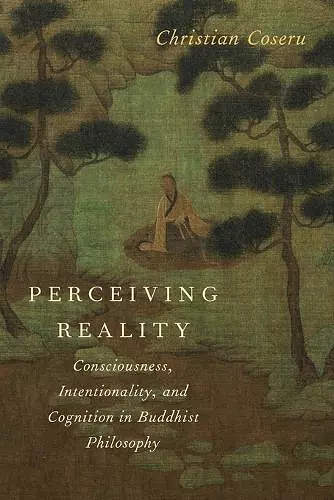Perceiving Reality
Consciousness, Intentionality, and Cognition in Buddhist Philosophy
Format:Paperback
Publisher:Oxford University Press Inc
Published:23rd Jul '15
Currently unavailable, and unfortunately no date known when it will be back
This paperback is available in another edition too:
- Hardback£110.00(9780199843381)

What turns the continuous flow of experience into perceptually distinct objects? Can our verbal descriptions unambiguously capture what it is like to see, hear, or feel? How might we reason about the testimony that perception alone discloses? Christian Coseru proposes a rigorous and highly original way to answer these questions by developing a framework for understanding perception as a mode of apprehension that is intentionally constituted, pragmatically oriented, and causally effective. By engaging with recent discussions in phenomenology and analytic philosophy of mind, but also by drawing on the work of Husserl and Merleau-Ponty, Coseru offers a sustained argument that Buddhist philosophers, in particular those who follow the tradition of inquiry initiated by Dign?ga and Dharmak?rti, have much to offer when it comes to explaining why epistemological disputes about the evidential role of perceptual experience cannot satisfactorily be resolved without taking into account the structure of our cognitive awareness. Perceiving Reality examines the function of perception and its relation to attention, language, and discursive thought, and provides new ways of conceptualizing the Buddhist defense of the reflexivity thesis of consciousness-namely, that each cognitive event is to be understood as involving a pre-reflective implicit awareness of its own occurrence. Coseru advances an innovative approach to Buddhist philosophy of mind in the form of phenomenological naturalism, and moves beyond comparative approaches to philosophy by emphasizing the continuity of concerns between Buddhist and Western philosophical accounts of the nature of perceptual content and the character of perceptual consciousness.
A well-crafted and important work, a work that will without doubt influence the discussion of Buddhist epistemology, and the analysis of the relation between Buddhist thought and phenomenology for years to come. * Mind *
This excellent book takes cross-cultural philosophy to a new high point by combining Indian Buddhist philosophy with Western phenomenology and philosophy of mind. Offering a rich account of perceptual consciousness, Coseru also casts new light on attention, sensation, self-awareness, and conceptualization. Philosophers of mind and Buddhist scholars alike will find many new insights throughout this groundbreaking book. * Evan Thompson, author of Mind in Life: Biology, Phenomenology and the Sciences of Mind *
Perceiving Reality is a masterful study of Buddhist epistemology. It is first and foremost a substantial contribution to the philosophical literature, developing a compelling account of epistemic authority in the context of the phenomenology of perception. It is also an excellent study of Indian Buddhist epistemological inquiry. The philology is impeccable. But it is always in the service of philosophy. Philosophers and Buddhologists must pay attention to Coseru's book. * Jay Garfield, Doris Silbert Professor in the Humanities and Professor of Philosophy, Smith College *
Perceiving Reality is a sophisticated defense of phenomenological naturalism in the philosophy of mind. A striking feature of this book is the outstanding re-descriptions of Indian Buddhist theory in a vibrant contemporary language, testament to the great dexterity with which Coseru moves in the thought-worlds of both classical Buddhism and contemporary phenomenology. Essential reading in the case it makes for comparative philosophy of mind; in particular, the significance of Indian Buddhist analysis in modern discussions of intentionality, self-consciousness, and conceptual content. * Jonardon Ganeri, author of The Self: Naturalism, Consciousness, and the First-Person Stance *
In both the breadth of his study and the important questions it raises, Coseru's work accomplishes a great deal. It will find an important place in the study of Buddhist philosophy. * H-Net *
The insights of [Coseru's] phenomenological interpretation of Buddhist theories of perception and self-awareness allow these ancient ideas to become live options for current debates in the philosophy of mind. Moreover, the ample references to empirical research lay the groundwork for further Buddhist engagement with the scientific study of consciousness and cognition. * Philosophy East and West *
ISBN: 9780190253110
Dimensions: 241mm x 163mm x 33mm
Weight: 680g
384 pages